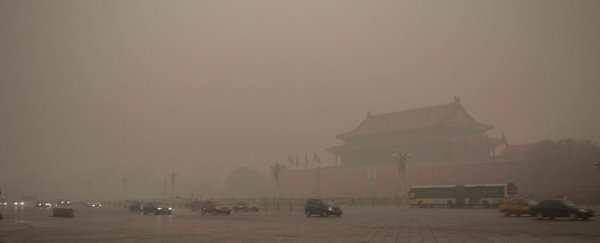China's capital Beijing has issued a red alert for air pollution for the first time ever, with a heavy cloud of dangerous smog blanketing the city.
The red alert – which is the most serious warning level on a four-tier system introduced in 2013 – is predicted to remain enforced until Thursday, at which point the air is expected to clear with the arrival of a forecasted cold front.
Until that time, however, school lessons have been cancelled, with kindergartens, primary schools, and high schools all suspending class. Outdoor construction has been shut down, and some industrial plants have also been closed.
"People should to the best of their ability reduce outdoor activities," cautioned Beijing's Environmental Protection Bureau on social media. "If you are engaging in outdoor activities you should wear a mask or take other protective measures."
While the red alert is in effect, half of Beijing's privately owned cars will be forced off the roads, with locals being permitted to drive on alternate days depending on whether they have odd or even numbers on their licence plates. Up to 30 percent of government vehicles will also be parked.
According to China's state-run news agency, Xinhua, this restriction will place a heavy burden on Beijing's public transport system, with an extra 2 million passengers expected to use buses and trains each day. The city will add up to 25,000 buses to the roads to shoulder the people load.
Beijing isn't the only city taking emergency steps, with Hebei, Shandong, Baoding, and Tianjin Municipality all implementing similar precautions in a first-of-its-kind collaborative action seeking to maximise the gains of anti-pollution measures.
The red alert comes on the back of a period of extreme smog for the city and follows an orange alert declared on Saturday. The extent of the problem can be seen from space, with NASA satellites indicating the pervasiveness of the massive blanket of pollution that's currently covering much of China.
The fact that last week's dangerously high smog levels – which hit 20 times the designated 'safe' limits set down by the World Health Organisation – did not themselves trigger a red alert was met with controversy within China's capital. Technically, a red alert means three consecutive days of severe smog, but the distinction doesn't wash with Beijing's residents.
"If today is a red alert, then what was it I was seeing last week?" asked one Chinese social media user, as reported by the ABC.
"I'm already indifferent, it's all a gas chamber anyway," complained another.
At time of writing, Beijing's real-time air quality index is close to 300 micrograms on the PM2.5 scale, which measures fine particles with a diameter of 2.5 micrometres or less. These are particularly dangerous to inhale since they can lodge in a person's lungs. The reading soared as high as 976 micrograms earlier in the month.
Globally, CO2 emissions are projected to hit a standstill this year and may even see a slight drop, and China says it will play its part in reducing its own emissions. Let's hope so, because the deadly smog we're seeing in Beijing and elsewhere in China this month is something that just shouldn't be allowed to happen.
